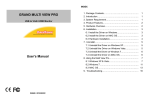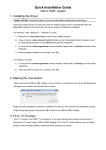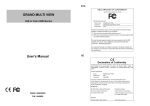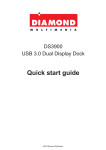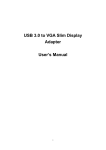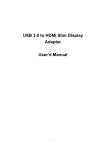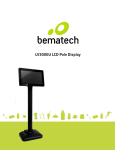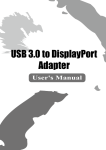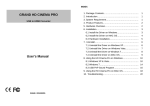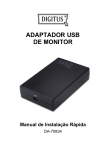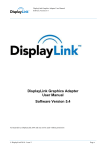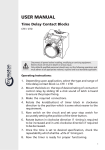Download User`s Manual GRAND MULTI VIEW
Transcript
FCC GRAND MULTI VIEW USB to VGA/ HDMI Monitor User’s Manual ISSUE: 2010/03/01 CE INDEX 1. Package Contents This package contains the following items: 1. 2. 3. 4. 5. 6. Package Contents……………..…....…………………….. 1 Introduction………………..………..……….……………... 1 System Requirement….…………….…..………………… 1 Product Features…….………….…………….…………... 2 Hardware Overview……………..…………….…………... 2 Installation…………………………..………..……..……… 3 6.1 Install the Driver on Windows………………..…....…. 3 6.2 Install the Driver on MAC OS…....………………..…. 3 6.3 Hardware Installation....…..………………………..…. 4 7. Uninstall………………..………..…………………………. 5 7.1 Uninstall the Driver on Windows XP………….……... 5 7.2 Uninstall the Driver on Windows Vista……….……... 5 7.3 Uninstall the Driver on Windows 7…………….……... 6 7.4 Uninstall the Driver on MAC OS…………………..…. 6 8. Using the Multi View…....……...…………………….….… 7 8.1 Windows XP & Vista…………………………………... 7 8.2 Windows 7….…………………………………………... 11 8.3 MAC OS……………………………………………..…. 13 9. Troubleshooting…………...…..…………………………. 16 Multi View USB Cable Driver CD (Driver & User Manual) 2. Introduction The Grand Multi View enables you to add an additional monitor to your desktop or laptop through USB 2.0 without VGA card. With the unit, you can extend your display across two monitors, you can surf website on one monitor and word processing on the other. What’s more, the mirror function allows you to display the same desktop image on two monitors. The Multi View supports VGA and HDMI outputs, and the resolution supports up to 1600 x 1200 or 1680 x 1050 (32bit). The Grand Multi View can be used for education (synchronous teaching-learning), and also can be used by art designer, architect or engineer (use second display for pallets or tools). The Multi View is designed to enhance work efficiency with fewer errors. 3. System Requirements Operating System: - Microsoft Windows 7 (32bit or 64bit)/ Vista (32bit or 64bit)/ XP (32bit). - Mac OS X Tiger 10.4.11/ Mac OS X Leopard 10.5.5 or above Processor: Intel Pentium Dual Core 1.8 GHz or above 1GB RAM or above Available USB 2.0 port 30Mb of available disk space NOTE: When connecting more Multi View to a computer, a system with higher CPU performance is recommend. 1 4. Product Features 6. Installation 6.1 Install the Driver on Windows Compatible with Windows 7 (32bit or 64bit)/ Vista (32bit or 64bit) and XP (32bit). Completely new architecture to support Vista Aero (32bit). Compatible with Mac OS X Tiger 10.4.11/ Mac OS X Leopard 10.5.5 or above. Easily connect monitors to one PC through USB 2.0. Windows OS: Up to 6 monitors. Mac OS: Up to 4 monitors. Supports VGA and HDMI outputs simultaneously. Supports resolution up to 1600 x 1200 or 1680 x 1050 (32 bit true color). No external power supply needed (power is supplied from the PC through USB connection). Dimensions: 100(L) x 55(W) x 33(H) mm. Bundled Software: Supports Distinct, Extended and Mirror Modes Supports screen resolution and color quality adjustment in extended mode. Allows you to rotate the screen on the add-on monitor by 90, 180 or 270 degrees Supports online update automatically. The software has been awarded Microsoft Windows Certification. Step 1: Insert the provided driver CD into your CD-ROM driver. Execute the Setup.exe file. <Driver> → <Windows> Step 2: A dialog box should pop up to prompt you to choose desired installing language. After choosing your language, click on I Accept to start installation automatically. Install on Windows XP Install on Windows Vista Install on Windows 7 Step 3: After finishing the installation, a dialog box should pop up to inform you to restart your PC for the installation to completed and usable. 5. Hardware Overview 6.2 Install the Driver on MAC OS Step 1: Insert the provided driver CD into your CD-ROM driver. Mount the Multi View Installer 1.1.dmg file. <Driver> → <MAC OS> Step 2: Double click the DisplayLink Software Installer icon to run the installer. Step 3: Click through the standard Mac Installer, accepting the EULA and allowing the system to reboot. NOTE: Mac OS X support can be found at http://www.displaylink.com/mac/ 2 3 6.3 Hardware Installation After finishing the software installation, please follow the steps below to complete the hardware installation. Step 1: Use the VGA or HDMI cable to connect your display device such as projector or display device that supports VGA or HDMI input. 7. Uninstall 7.1 Uninstall the Driver on Windows XP Step 1: Open the Control Panel: Start → Control Panel → Add or Remove Programs. Step 2: Select the DisplayLink Graphics and click Remove to uninstall. Step 2: Connect the Multi View to an USB 2.0 port of your computer by using the provided USB cable. 7.2 Uninstall the Driver on Windows Vista Step 1: Open the Control Panel: Start → Control Panel → Programs and Features. Step 2: Select the DisplayLink Graphics and click on Uninstall. Step 3: Click Yes to uninstall it. 4 5 7.3 Uninstall the Driver on Windows 7 8. Using the Multi View Step 1: Open the Control Panel: Start → Control Panel → Programs 8.1 Windows XP & Vista 8.1.1 Using the Multi View DisplayLink Manager When devices are attached, an icon appears in the task bar. Right-clicking the icon will bring out the DisplayLink manager menu. Step 2: Double click on the DisplayLink Graphics, then a windows confirmation dialog will open. Windows XP Windows Vista Step 3: Click Yes to uninstall it. 7.4 Uninstall the Driver on MAC OS Step 1: Mount the Multi View Installer 1.1.dmg file on the provided CD. Step 2: Click DisplayLink Software Uninstaller. Step 3: Click through standard Mac uninstaller. Step 4: After reboot, the USB Video driver will have been removed. 6 7 Select an option from the menu, using the following table for the options available. Menu Option Sub-menu Option Description Connects to the Update Server to check for Check Now newer driver versions and downloads them, if You can also adjust the resolution, color quality, position and refresh rate from the Windows Display Properties dialog box. Select the Advanced item from the DisplayLink manager menu to open the Display Settings window. available. Updates Opens the Update Options window where you Configure can configure automatic updates. Screen Resolution Displays a list of available resolutions. Changes the color depth of the extending Medium (16-bit) display to 16bit. Color Quality Changes the color depth of the extending Highest (32-bit) display to 32bit. No rotation is applied to the DisplayLink Normal display. Rotates the extended or mirrored display by Rotated Left 270 degrees. Screen Rotation Rotates the extended or mirrored display by 90 Rotated Right degrees. Rotates the extended or mirrored display by Upside-Down 180 degrees. Extends the display to the right of the main Right Extend To 8.1.2 Windows Display Properties display Extends the display to the left of the main Left display. Above Extends the display above of the main display. Below Extends the display below the main display. Extends your desktop onto the secondary Extend 1. 2. 3. 4. Extend/ Mirror Function: Check or uncheck the Extend the desktop onto this monitor checkbox to set the Extend or Mirror mode. Resolution: Set the screen resolution using the resolution slide bar. Colors: Select the color quality from the colors drop-down list. Position: Arrange its position with respect to the other monitors on the extended desktop in using the drag area. display. Set as Main Monitor Sets the secondary display as the main 8.1.3 Using More Multi View display. It doesn’t need to install driver again as long as you has completed above process of driver installation in advance. All the Multi View will list in the Display Properties or the display manager menu. Switches off the display of an attached Notebook Monitor Off notebook and makes the DisplayLink display primary. Copies what is on the main display and Mirror reproduces it on the secondary display. Off Switches off the secondary display. Configures the secondary display for optimum Optimize for Video full screen video performance output. (Note: (Windows Vista & 7 Only) Text may appear less clear when enabled) Advanced Opens the Display Settings window. 8 NOTE: When connecting more Multi View to a computer, a system with higher CPU performance is recommend. 9 8.1.4 Firmware Update 8.2 Windows 7 8.2.1 Windows Display Properties (WDP) Manually Update Click the Updates → Check Now…, and it will check and download the latest firmware immediately.. NOTE: Confirm that your computer is already connected to the network. On Windows 7, you can configure the Multi View from the Windows Display Properties (WDP). WDP provides a simple method to attach, rotate, duplicate or extend screens as well as modify screen resolution. To open WDP: Right-click on the desktop, then select Screen Resolution to open the WDP. Set the display options. Refer to the table below for details on each option. Menu Sub-menu Description Use the drop down list to select a display to be Display configured. Use the drop down list and use the slider to Resolution Configuring Updates choose a resolution. Landscape Click the Updates → Configure… , the Updates Options window will appear as shown Sets the display to landscape view. Portrait below. You can set the update method and frequency in the windows. Orientation Sets the display to portrait mode. Sets the display to upside down landscape Landscape (flipped) mode. Portrait (flipped) Sets the display to upside down portrait mode. Duplicates these displays Extend these displays display. Show Desktop only on 1 Show Desktop only on 2 The desktop appears on the display marked 1. The display marked 2 becomes blank. The desktop appears on the display marked 2. The display marked 1 becomes blank. It is also possible to use Windows Key + P to display a menu (and cycle through it) to switch mode. 10 display. Extends the main display onto the secondary Multiple displays Reproduces the main display on the second 11 8.3 MAC OS 8.2.2 DisplayLink Manager Menu From the taskbar, click the Show hidden icons arrow to show available icons. Select Displays from the System Preferences menu. This will open a Display Preferences window on each of your attached displays allowing you to configure each display as required. Click the DisplayLink icon . A menu appears with several options, as described in Setting the Display Resolutions To change the display’s resolution, select an available resolution from the Display the following table. Preferences window of the display you wish to change. Menu Check for updates Description Connects to the Windows Update and checks for newer versions and downloads them, if available. Select the option for better movie playback performance on the DisplayLink Optimize for Video enabled displays. Only select the option when playing back video content. (Note: Text may appear less clear when enabled) Advanced Opens the Windows Display Properties (WDP). Rotating a Display Use the Rotate drop down, and select the appropriate angle of rotation. 12 13 Setting the Position Displays Setting the Display to Extend You can arrange your displays so that they match the physical layout of your displays by To extend connected displays, make sure that the Mirror Display on the Arrangement pane selecting the Arrangement pane within Display Preferences. This ensures that you can is unchecked. easily navigate between all connected displays. To move the position of a display, click and hold the display you wish to move then drag it to the desired position. The display will be highlighted with a red border whilst you are moving the display to its new position. Using both Extended and Mirrored Displays To work with both extended and mirrored displays, turn off mirroring than in the Arrangement pane press and hold cmd and alt and drag and drop the display you wish to mirror over the primary display. Repeat this with each display you wish to mirror, those untouched will remain extending. Setting the Display to Mirror Mode When in Mirror mode, additional displays will display what is being shown on the primary display. Checking the Mirror Display on the Arrangement pane enables this feature. Changing the Main Display You can change which is the main display by moving the Menu Bar between displays. Changing the main display affects where new windows appear and the position of the Dock. The Menu Bar can be moved so that is shown on an alternative display. Clicking the white menu bar and dragging it to the desired display will perform this action. 14 15 9. Troubleshooting Situation Check Point 1. Make sure you restart your computer after the driver installation. 2. Check all the connectors are plugged in correctly. 3. Make sure the USB port that you are using is USB 2.0. The device driver has been installed, but the Multi View is not working 4. Check the additional monitor is connected correctly and the power is on. 5. Make sure the operating system The Multi View is compatible with Windows 7 (32bit or 64bit), Vista (32bit or 64bit), XP (32bit) or Mac OS X Tiger 10.4.11/ Mac OS X Leopard 10.5.5 or above. 6. Try a different USB 2.0 or computer. DVD player not working when move it over to the extended display 1. Try to open the program in the additional display The mouse not move pass the right side of the screen as it should on extended desktop 1. first before playing the DVD. Check the display settings and make sure that your display number 2 is on the right side of display number 1. 16










